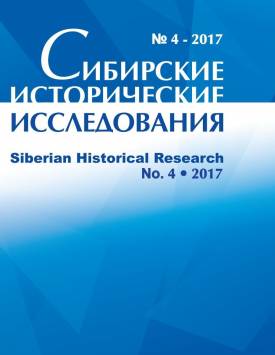The diversity of natural resource governance in the Russian Arctic
Many indigenous peoples in the Arctic have a longer experience of engaging with its resources than Russians or other peoples who have their own states. What are the governance approaches of these people to the natural resources and their territories, and in what ways do these approaches differ from each other? In this article, we analyse the relationship of two Arctic Russian peoples to natural resources governance on their ancestral lands and to regulative practice by the Federal Russian State, which adopted laws based on the idea of extractivism. We demonstrate the value of studying the tradition of leadership and what we call the 'craving for statehood' using two examples, the Sakha and the Nenets people. We explain why the Sakha people try to ensure their participation in the natural resource governance through the adoption of regional laws, while the Nenets concentrate on solving specific problems affecting directly their reindeer herding and fishing lifestyle. This understanding becomes possible by taking into account in detail the history of the culturally specific social structure of a society of a certain people and its own leadership institutions. With this comparison in the article, we demonstrate an unexpectedly rich diversity of natural resource governance and non-Russian legal traditions in the 'ethnic' Russian Arctic. It is worth nothing that all this diversity unfolds within the general framework of a single legal space under the umbrella of the constitution of the Russian Federation as a post-Westphalian nation state.
Keywords
правовые традиции коренных народов,
управление природными ресурсами,
Арктическая добывающая промышленность,
экстрактивизм,
саха (якуты),
ненцы,
indigenous legal traditions,
natural resources governance,
Arctic extractive industries,
extractivism,
Sakha (Yakuts),
NenetsAuthors
| Ivanova Aytalina A. | North-Eastern Federal University | ivanovaaytalina@mail.ru |
| Stammler Florian M. | University of Lapland | fstammle@ulapland.fi |
Всего: 2
References
Acosta A. Extractivism and neoextractism: two sides of the same curse // Beyond Development. Alternative Visions from Latin America / eds. by M. Lang, D. Mokrani. Amsterdam: Transnational Institute, 2013
Bolotova A. Loving and Conquering Nature: Shifting Perceptions of the Environment in the Industrialised Russian North // Europe-Asia Studies. 2012. № 64 (4). P. 645-671
Behnke R.H., Fernandez -Gimenez M.E., Turner M.D., Stammler F. Pastoral migration: mobile systems of livestock husbandry // Animal Migration / eds E.J. Milner-Gulland, J.M. Fryxell, A.R.E. Sinclair. Oxford: Oxford University Press, 2011. P. 144-171
Behrends A., Reyna S., Schlee G. (eds.) Crude Domination: an Anthropology of Oil. New York; Oxford: Berghahn Books, 2011
Forbes B.C., Stammler F., Kumpula T., Meschtyb N., Pajunen A., Kaarlejarvi E. High resilience in the Yamal-Nenets social-ecological system, West Siberian Arctic, Russia // Proceedings of the National Academy of Sciences. 2009. Vol. 106, № 52. P. 22041-22048 + 9 supplementary information
Golovnev A. Indigenous Leadership in Northwestern Siberia: Traditional Patterns and Their Contemporary Manifestiations // Arctic Anthropology. 1997. № 34 (1). P. 149-166
Nadasdy P. Adaptive co-management and the gospel of resilience // Adaptive co-management: collaboration, learning and multi-level governance / eds. by D. Armitage, F. Berkes, N. Doubleday. Vancouver, B.C.: UBC Press, 2007. P. 208-227
Reyna S., Behrends A. The Crazy Curse and Crude Domination: Towards an Anthropology of Oil // Crude Domination: an Anthropology of Oil / eds. by A. Behrends, S. Reyna, G. Schlee. New York; Oxford: Berghahn Books, 2011. P. 1-15
Shadian J.M. The Politics of Arctic Sovereignty: Oil, Ice, and Inuit Governance. London: Routledge, 2014
Stammler F. Reindeer Nomads Meet the Market: Culture, Property and Globalisation at the End of the Land. Мйnster: Lit Verlag, 2005a
Stammler F. The Obshchina Movement in Yamal: Defending Territories to Build Identities? // Rebuilding Identities: Pathways to Reform in Postsoviet Siberia / ed. by E. Kasten, Siberian Studies. Berlin: Reimer, 2005b. P. 109-134
Stammler F. Oil Without Conflict? The Anthropology of Industrialisation in Northern Russia // Crude Domination: an Anthropology of Oil / eds. by A. Behrends, S. Reyna, G. Schlee. New York; Oxford: Berghahn Books, 2011. P. 243-269
Stammler F., Ivanova A. Confrontation, coexistence or co-ignorance? Negotiating human-resource relations in two Russian regions // The Extractive Industries and Society. 2016. Vol. 3, № 1. P. 60-72
Борисов А.А., Дамешек Л.М. Степные думы Сибири: исторический опыт самоуправления в имперской системе власти // Известия Иркутского государственного университета. Сер. Политология. Религиоведение. 2011. № 1 (6). С. 123-135
Гоголев А.И. История Якутии. Якутск: Изд-во Якут. гос. ун-та, 2005
Головнёв А.В., Перевалова Е.В., Белоруссова С.Ю. Киссер Т.С. Этнопроект, или Персонализация этничности // Уральский исторический вестник. 2016. № 4 (35). C. 142-148
Гордиенко Л. Аборигенов лишили квот в парламентах Ямала. 2005. URL: http://www.vsluh.ru/news/politics/52993.html
Добрецов Н.Л., Похиленко Н.П. Минеральные ресурсы Российской Арктики, проблемы и технологии их освоения // Геология и геофизика. 2010. Т. 51, № 1. С. 126-141
Иванова Т.С. Государственность Республики Саха (Якутия): истоки, пути развития, проблемы. Якутск: Якут. филиал Изд-ва СО РАН, 2002
Иванова А.А. К проблеме выбора альтернативы государственно-политического развития Якутии в начале XX века // Проблемы и перспективы современного права. Уфа: РИЦ БашГУ, 2014. С. 10-12
Мандзяк Р. За двадцать лет Конституция Якутии изменилась до неузнаваемости. 12.06.2012. URL: http://www.vsesmi.ru/news/6161899/
Попов С.Н. Самоуправление в догосударственных обществах // Вестник Челябинского государственного университета. 2007. № 17. URL: http://cyberleninka.rU/artide/n/ samoupravlenie-v-dogosudarstvennyh-obschestvah
Хомич Л.В. Ненцы: Очерки традиционной культуры. СПб.: Русский Двор, 1995
Штаммлер Ф.М. Кочевой образ жизни оленеводов в прибрежной зоне Западной Сибири (Ямал): возможности и ограничения в свете недавних перемен // Экологическое планирование и управление. 2008. № 3-4 (8-9). С. 78-91

